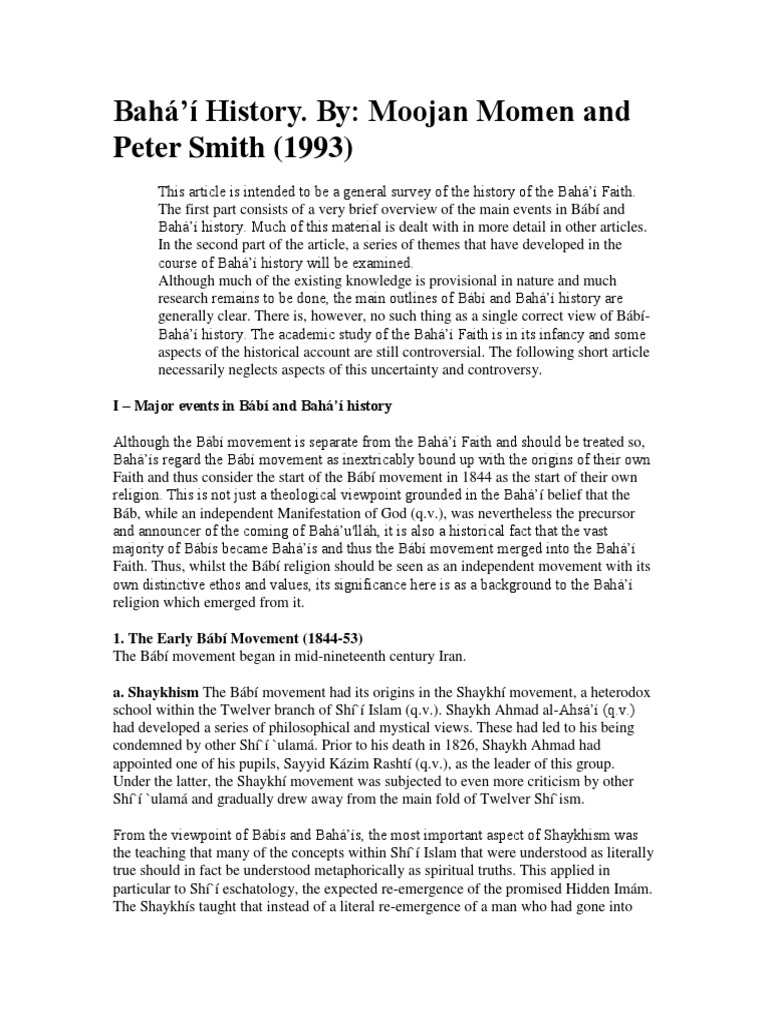The concept of history reverberates through time, an intricate tapestry woven with the threads of knowledge, belief, and identity. In examining Baha’i teachings, one is drawn to ponder: “Which history do you believe in?” This introspective question beckons believers to navigate through the annals of time, both as a collective of humanity and as individuals who contribute to the ever-evolving narrative. The Baha’i Faith, with its profound reverence for the past, offers a unique appeal in how it interlaces history with spiritual insight.
At the heart of Baha’i teachings lies the notion of progressive revelation. This paradigm posits that divine guidance is not a stagnant reservoir but rather a flowing river, continuously nourishing the thirsty souls of humanity. Each Manifestation of God, from Moses to Muhammad, and ultimately Baha’u’llah, represents a distinct chapter in this unfolding narrative. Each chapter is not merely a recitation of events but a reimagining of truth, punctuated by the unfolding potential of the human spirit.
Engaging with Baha’i history invites one to adopt a kaleidoscopic perspective on humanity’s legacy. Rather than a singular, linear timeline, Baha’i teachings emphasize interconnectedness in the spiritual and historical domains. The Baha’i experience does not seek to diminish the significance of prior revelations but rather enhances them, creating a multilayered understanding of Divine intent. Believers are encouraged to view historical events as the stepping stones of an evolving civilization, where each step is imbued with meaning and spiritual significance.
The metaphor of the garden is particularly resonant in Baha’i teachings. Just as a garden flourishes with diverse flora, so too does humanity thrive through its myriad religions and races. The Baha’i Faith embodies an inclusive philosophy, advocating for unity amidst diversity. The rich soil of historical context nourishes this garden. Each flower represents a different interpretation of truth, blooming in its unique time and space. By recognizing the beauty and value in these diverse expressions of faith, one can cultivate a deeper understanding of a shared spiritual legacy.
Moreover, the Baha’i teaching of the Oneness of Humanity serves as an unwavering compass in navigating historical complexities. This principle urges believers to transcend ephemeral divisions, illuminating the shared experiences and lessons that bind us together. The history of humanity, laden with conflict and strife, is interpreted through this lens as an opportunity for growth and evolution. A Baha’i’s reflection on past events must thus be tempered with the awareness that every chapter carries the potential for reconciliation and understanding.
In contemplating the historical contexts in which Baha’u’llah emerged, it is imperative to acknowledge the socio-political climate of 19th-century Persia. The narrative is steeped in adversity, where Baha’u’llah faced persecution and exile for advocating principles of love, justice, and unity. This backdrop frames the essence of Baha’i teachings, rooted in an unwavering commitment to peace and the establishment of a global society founded upon justice. The tumultuous waves of history, rather than drowning the teachings, serve as the very crucible from which they emerged, reinforcing the belief that out of conflict can arise transformative change.
This understanding of history as a double-edged sword—painful yet enlightening—encourages a reflective approach. Embracing the teachings of the past allows individuals to glean wisdom from the triumphs and tribulations of previous generations. Moreover, the Baha’i narrative impels believers to take conscious ownership of their historical legacy. With this ownership comes the intellectual responsibility to discern, evaluate, and distill lessons from the past, recognizing that history is as much about understanding others as it is about understanding oneself.
Furthermore, the Baha’i perspective encourages believers to engage in the pursuit of knowledge actively. The “The Book of Certitude” articulates a powerful reminder of the importance of inquiry and contemplation in the quest for truth. The pursuit is not merely academic; it is spiritual and profound. It is through such inquiry that one can navigate the labyrinth of history, discerning the strands of truth that resonate throughout time. Knowledge acts as both a guiding star and a mirror, reflecting the evolving consciousness of humanity.
In engaging with the essence of history, Baha’is are urged to foster a spirit of unity and collaboration. The metaphor of a mosaic comes to mind, where individual pieces, although distinct, when viewed collectively create a breathtaking visage of beauty and harmony. This artistic approach to history encourages believers not only to honor their own tradition but also to celebrate the rich tapestry of religious belief that permeates existence. In doing so, a Baha’i embodies the essence of their teachings—each action taken towards unity, each word spoken in the spirit of love, contributes to humanity’s collective narrative.
As believers delve deeper into the historical tapestry of the Baha’i Faith and beyond, they are invited to embrace their role as co-authors of a new chapter. This chapter is replete with the infinite possibilities that arise when individuals commit to reconciling the past while striving for a harmonious future. In understanding which history one believes in, the Baha’i teaching not only reframes how one perceives the past but also illuminates the path towards a unified future, echoing timeless truths that remain relevant across generations.
